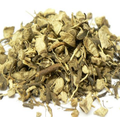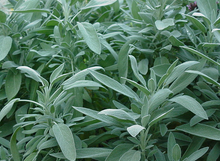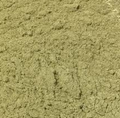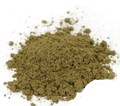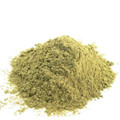 Loading... Please wait...
Loading... Please wait...- Home
- Herbs - Organically Grown & Wild Crafted USA
- R S T
- Sage Leaf Powder
Product Description
Sage Leaf Powder
Also Known As – Salvia officinalis L
Organically Grown - USA
Overview - Sage, as its name implies, is said to carry powers of wisdom, as well as longevity. It was considered a valuable commodity in 17th century China, when merchants would trade 3 or 4 chests of tea for one chest full of sage.
- Sage is known as a cure-all. Native Americans mixed the herb with bear grease to create an all-purpose salve.
- Sage tea mixed with vinegar was given during the time of the plague.
- The botanical name (Salvia officinalis) is derived from salvere, meaning “to be in good health.” In former times, sage was regarded as a sacred herb, often referred to as Salvia salvatrix, meaning “Sage the Savior.”
- In Cyprus and Egypt, after a great plague, the women were forced to drink sage juice, to cause them to be more fruitful.
- An ancient Chinese proverb says, “How can a man grow old who has sage in his garden”.
Medicinal Uses - Sage could almost be called a cure all. Sage acts as an antiseptic and soothes coughs and colds, flu, asthma, bronchitis, pneumonia, swollen glands, laryngitis, consumption, blood cleanser, laxative, increases menstrual flow, a relaxant for nervous disorders, headaches, and fevers, spermatorrhea, hair loss, calms nervousness, prevents night sweats, expels worms, treats quinsy, palsy, used in liver and kidney troubles, inflammations, typhoid, scarlet fever, measles, smallpox, soothes nervous troubles, relieves headaches. It also is used to inhibit perspiration. Good for the whole digestive system, dyspepsia, gas in the stomach. Can be used as a gargle or mouthwash to cure sore throats, canker sores, and sore gums, and as a lotion to heal ulcers, old wounds, varicose vein ulcers, sores, and skin eruptions. It will also staunch bleeding from wounds. Very effective for the treatment of cystitis.
- Sage has always been thought of as good for the brain, improving the memory and, in some cases, even as a cure for insanity. It is a powerful nervine and will stop any involuntary trembling of the limbs. Also, a sprig of sage in the wardrobe will keep away moths. Sage is used for dandruff and is an effective hair tonic. It will make hair grow if the roots have not been destroyed. Once used for premature graying hair.
Other Uses – When weaning a baby, or when it is desired to stop the flow of milk for reasons of sickness, etc., drink sage tea cold and it will cause the milk flow to cease. Native Americans smoked sage leaves as pipe tobacco.
- Use as a companion plant with broccoli, cauliflower, rosemary, cabbage, and carrots to deter cabbage moths, beetles, black flea beetles and carrot flies. Do not plant near cucumbers, onions or rue. Sage repels cabbage moths and black flea beetles. Allowing sage to flower will also attract many beneficial insects and the flowers are pretty. There are some very striking varieties of sage with variegated foliage that can be used for their ornamental as well as practical qualities.
Parts Used – Leaves
Precautions - It is inadvisable to “elevate” sage tea to the status of house tea, because its use over time can lead to intestinal disturbances. Extended or excessive use of sage can cause symptoms of poisoning.
- Avoid use of sage for epileptics, sage contains thujone which can trigger a convulsion in epileptics.
- Nursing mothers should avoid this herb as it suppresses mammary secretions.
- Avoid therapeutic doses in pregnancy; it is a uterine stimulant. Small amounts used in cooking are quite safe.
Preparation and Dosage - Infusion: steep 1 tsp. leaves in 1/2 cup water for 30 minutes. Take 1 cup per day, a tbsp. at a time. Children need smaller doses. Honey and lemon may be added to taste.
- Powder: take 1/4 to 1/2 tsp. powdered leaves at a time.
- Tincture: Take 15-40 drops, 3 to 4 times per day.
- Standard infusion: or 3-9 grams; tincture, 10-30 drops.
Disclaimer - These products are not intended to diagnose, treat cure or prevent any disease. Reviews are not intended as a substitute for appropriate medical care or the advice of a physician or another medical professional. Actual results may vary among users. Mountain Maus Remedies LLC makes no warranty or representation, expressed or implied, as to the accuracy or validity of the information contributed by outside product review submissions, and assumes no responsibility or liability regarding the use of such information. The information and statements regarding the dietary supplements have not been evaluated by the Food and Drug Administration. If you have a medical condition or disease, please talk to your health care provider. If you are currently taking a prescription medication, you should work with your health care provider before discontinuing any drug or altering any drug regimen, including augmenting your regimen with any herb or dietary supplements. Do not attempt to self-diagnose any disease or ailment based on the reviews and do not use the information contained herein for diagnosing or treating a health problem or disease. Proper medical care is critical to good health. If you have a health concern or suspect you have an undiagnosed sign or symptom, please consult a physician or health care practitioner.
© Mountain Maus Remedies. All Rights Reserved


